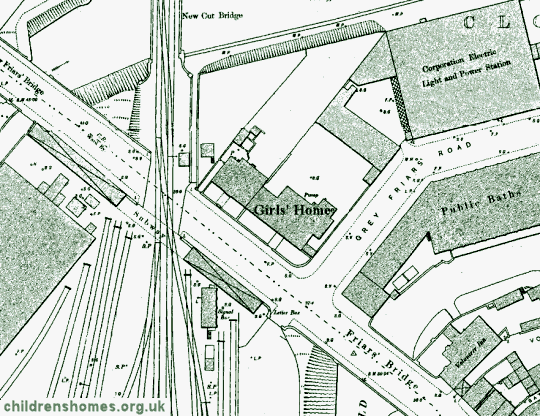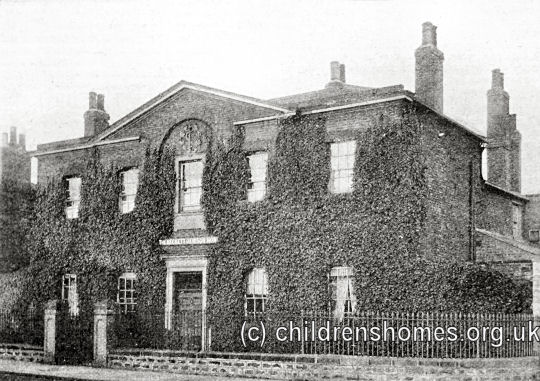Doncaster Girls Home and School of Industry, Doncaster, West Riding of Yorkshire
The Doncaster Girls Home and School of Industry was originally established in 1799 at French Gate, Friars Bridge, Doncaster.
In 1862, the home was refounded and subsequently came the management of Miss Beckett Denison of The Hall, Doncaster, who performed the role for more than thirty years. The establishment provided a home for 'female servants, orphans or children who have lost one parent'. The home was certified to receive girls placed there by the Boards of Guardians who administered the poor relief and workhouse system. A charge was made of four shillings a week for girls placed there by Guardians, while those supported by friends paid a slightly higher rate of £12 a year. The home could accommodate up to 30 girls aged from 10 to 15. They were trained in laundry work, needlework and knitting.
The location of the home is shown on the 1902 map below.

Doncaster Girls Home and School of Industry site, Doncaster, c.1902.
In 1901, the running of the home was taken over by the Waifs and Strays Society, becoming known as the Beckett Denison Home for Girls. It then housed around 20 girls, aged from 7 to 14. Miss Beckett Denison maintained an active interest interest in the school although withdrew from its formal administration.

Beckett Denison Home for Girls, Doncaster, 1902. © Peter Higginbotham
The home, which was located near the railway in a run-down part of Doncaster, was closed in 1905 owning to increasing concern about the girls' health. The residents moved to new premises know in the Balby area of Doncaster which became known as the St Christopher Home.
The French fate premises no longer exist.
Records
Note: many repositories impose a closure period of up to 100 years for records identifying individuals. Before travelling a long distance, always check that the records you want to consult will be available.
- Index of the Society's first 30,000 children's case files ordered by surname.
- Index of the Society's first 30,000 children's case files ordered by date of birth.
- The Children's Society Records and Archive Centre is at Unit 25, Springfield House, 5 Tyssen Street, London E8 2LZ (email: archives@childrenssociety.org.uk). Files for children admitted to its homes after September 1926 were microfilmed in the 1980s and the originals destroyed. Some post-1926 files had already been damaged or destroyed during a flood. The Society's Post-Adoption and Care Service provides access to records, information, advice, birth record counselling, tracing and intermediary service for people who were in care or adopted through the Society.
- The Society has produced detailed catalogues of its records relating to disabled children, and of records relating to the Children's Union (a fundraising body mostly supported from the contributions of children).
Bibliography
- Bowder, Bill Children First: a photo-history of England's children in need (1980, Mowbray)
- Church of England Waifs and Strays' Society [Rudolfe, Edward de Montjoie] The First Forty Years: a chronicle of the Church of England Waifs and Strays' Society 1881-1920 (1922, Church of England Waifs and Strays' Society / S.P.C.K.)
- Higginbotham, Peter Children's Homes: A History of Institutional Care for Britain's Young (2017, Pen & Sword)
- Morris, Lester The Violets Are Mine: Tales of an Unwanted Orphan (2011, Xlibris Corporation) — memoir of a boy growing up in several of the Society's homes (Princes Risborough, Ashdon, Hunstanton, Leicester) in the 1940s and 50s.
- Rudolf, Mildred de Montjoie Everybody's Children: the story of the Church of England Children's Society 1921-1948 (1950, OUP)
- Stroud, John Thirteen Penny Stamps: the story of the Church of England Children's Society (Waifs and Strays) from 1881 to the 1970s (1971, Hodder and Stoughton)
Links
- Hidden Lives Revealed — the story of the children who were in the care of The Children's Society in late Victorian and early 20th Century Britain.
- The Children's Society
Except where indicated, this page () © Peter Higginbotham. Contents may not be reproduced without permission.


